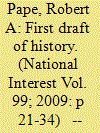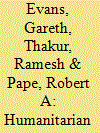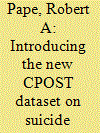| Srl | Item |
| 1 |
ID:
062889


|
|
|
|
|
| Publication |
New York, Random House, 2005.
|
| Description |
335p.
|
| Standard Number |
9781400063178
|
|
|
|
|
|
|
|
|
|
|
|
Copies: C:1/I:0,R:0,Q:0
Circulation
| Accession# | Call# | Current Location | Status | Policy | Location |
| 049778 | 303.625/PAP 049778 | Main | On Shelf | General | |
|
|
|
|
| 2 |
ID:
085517


|
|
|
| 3 |
ID:
120049


|
|
|
| 4 |
ID:
180202


|
|
|
|
|
| Summary/Abstract |
The University of Chicago Project on Security and Threats presents the updated and expanded Database on Suicide Attacks (DSAT), which now links to Uppsala Conflict Data Program data on armed conflicts and includes a new dataset measuring the alliance and rivalry relationships among militant groups with connections to suicide attack groups. We assess global trends in suicide attacks over four decades, and demonstrate the value of the expanded DSAT with special attention to the growing diffusion of suicide attacks in armed conflicts and the large role of networks established by Al-Qaeda and the Islamic State through 2019 in this diffusion. Overall, the expanded DSAT demonstrates the advantages of integration across datasets of political violence for expanding research on important outcomes, generating new knowledge about the spread of particularly deadly forms of political violence, and raising important new questions about the efficacy of current policies to curb their spread.
|
|
|
|
|
|
|
|
|
|
|
|
|
|
|
|
| 5 |
ID:
137130


|
|
|
|
|
| Summary/Abstract |
In his article, Roland Paris identifies five insurmountable structural problems of preventative humanitarian intervention and that my Pragmatic Standard (as well as others) do little to remedy them.1 His ‘structural problems’, however, are only insurmountable because he has defined them as such. As a result, his criticism of my argument is off the mark.
Paris initially credits that my Pragmatic Standard's three pillars – (1) an ‘ongoing campaign of mass homicide’; (2) a ‘viable plan of intervention’, including an expectation of ‘near zero’ casualties among the interveners; and (3) a ‘workable strategy for creating lasting security, so that saving lives in the short team does not lead to open-ended chaos’,2 with many more killed in the longer term – are helpful. He objects, however, that the pillars still lead to three problems: first, creation of a moral hazard; second, insufficient time for preventive action; and third, lack of certainty that future atrocities would occur without intervention.
|
|
|
|
|
|
|
|
|
|
|
|
|
|
|
|
| 6 |
ID:
065312


|
|
|
| 7 |
ID:
050461


|
|
|
|
|
| Publication |
Mar-Apr 2004.
|
| Summary/Abstract |
Precision air weapons have revolutionized modern warfare, but not by making it easier to kill enemy leaders. Decapitation alone still doesn't work; wars are still won by pummeling troops in the field. The new weaponry makes it easier to hammer the enemy's forces from the air--but only when they are kept in place by ground forces.
|
|
|
|
|
|
|
|
|
|
|
|
|
|
|
|
| 8 |
ID:
092886


|
|
|
| 9 |
ID:
113674


|
|
|
|
|
| Publication |
2012.
|
| Summary/Abstract |
When should the United States and other members of the international community intervene to stop a government from harming its own citizens? Since World War II, the main standard for intervention has been the high bar of genocide, although the international community has rarely acted to stop it. The main alternative-the "responsibility to protect"-would set the bar so low that virtually every instance of anarchy or tyranny would create unbounded obligations beyond the capacity of states to fulfill. A new standard-the pragmatic standard of humanitarian intervention-can help guide decisionmakers on when to intervene to stop governments from targeting their own citizens. The standard has three requirements: (1) an ongoing campaign of mass homicide sponsored by the government; (2) a viable plan for intervention with reasonable estimates of low casualties for the intervening forces; and (3) a workable strategy for creating lasting local security for the threatened population. The pragmatic standard was met in the recent successful intervention in Libya as well as in other cases over the last twenty years, and it should become the basis for deciding which humanitarian crises justify international intervention in the future.
|
|
|
|
|
|
|
|
|
|
|
|
|
|
|
|